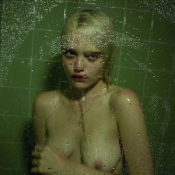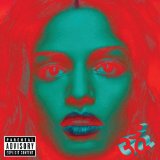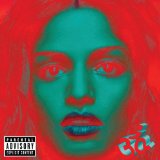An artist who is consumed by his own obsession with culture, music and art, West has made the most startling album of his career so far. Where lyrical and sonic power collide magnificently, thematically “Yeezus” is an album about racism and ego and sex and sounds like nothing that you’ve heard from any of the rap or pops big players this year. Always one step ahead of every genre, West has made an album that incorporates brutal and beautiful techno, Nina Simone, Marilyn Manson and Daft Punk sounding like you wish they did on their own record. A collection that restores faith in creativity and the passion of self-expression; Kanye West really may be a god, just please don’t tell him.
In addition to changing their name and downsizing in 2013, NYPC (formerly known as New Young Pony Club) have somewhat surprisingly also released a brilliant record. Their self-titled third album is proof that the key members of this group needed to lighten the load somewhat in order to deliver what they’ve promising since 2005’s tasty ”Ice Cream”. This, their best album by some distance, is a master class in electronic pop music that has personality and class. Concise, muscular with divine melodies and gleaming electronics throughout, it puts the rather substantial competition in the shade.
Miley may have got their first with the “Bangerz” title but MIA’s outstanding fourth album is stacked to the ceiling with them. This was always going to be a difficult release as the critical spotlight had suddenly turned on the Sri Lankan-born and London-based rapper but instead of getting mad, MIA got ecstatic. Vocals that can sound like gunshots, delirious rhythms and textures and just one massive indie, world-rave bash after another; “Mantangi” is the most pure and celebratory representation of MIA to date.
 Sky Ferreira – “Night Time, My Time”
Sky Ferreira – “Night Time, My Time”
Oh, Sky, the ultimate 21st century pop star who never releases any music, until now, sort of. Still unavailable in the UK, Sky Ferreira’s debut album was finally released in some parts of the world in late 2013. Nearly four years in the making, it’s a far cry from her earlier electro pop, although traces remain if you listen hard enough. Sounding like it was recorded in 1978 and produced by Mike Chapman, the missing album between Blondie’s “Plastic Letters” and “Parallel Lines” would just about do it justice. A big, weird rock’n’pop album that entrances with liquid melodies and Ferreira’s ability to seduce just about anyone, this is music that was made for the Top of the Pops studio and a massive great hairbrush.
Some of the year’s most intricate and soulful music, and this is indeed an extremely musical album, can be heard on Anna Calvi’s intimate and daring second album “One Breath”. Partly because of the assertive and very academic use of an orchestra, Calvi has created songs which take expected turns into light and dark. Like a more feral and restless sister recording to Agnes Obel’s also excellent 2013 album “Aventine”, “One Breath” is both a dramatic and cathartic experience that firmly cements Anna Calvi’s place within the genre.
 M.I.A. has gone through a bit of a hard time. Her last album “Maya” was not loved, she was accused of hypocrisy because she may or may not have consumed truffle french fries whilst being interviewed by The New York Times and her relationship with the obsessively revered Julian Assange (which is continued here) bothered some and problems with both her record company and her own marriage were publicly discussed. She is a fascinating artist, as unique and important as Bjork and, like Bjork, her work could only ever be hers. In respect to the first criticism at least, 2010’s “Maya” was widely slated as inaccessible, ugly-sounding and, the inevitable, ‘hard to love’. Even early musical partner Diplo expressed his concern about her apparent lack of judgement and choice of collaborators but this reaction was one that perplexed. Featuring her most brilliant pop moment ever with “XXXO”, a lovely cover version of Spectral Display’s “It Takes a Muscle” and “Born Free” with its insane ginger-haired army video and Suicide sample, the album was thrillingly eclectic and intricate. It differed from previous releases though, in that M.I.A. had strayed somewhat from sounding like her and this is what’s addressed in “Matangi”, M.I.A. sounds a lot like herself again.
M.I.A. has gone through a bit of a hard time. Her last album “Maya” was not loved, she was accused of hypocrisy because she may or may not have consumed truffle french fries whilst being interviewed by The New York Times and her relationship with the obsessively revered Julian Assange (which is continued here) bothered some and problems with both her record company and her own marriage were publicly discussed. She is a fascinating artist, as unique and important as Bjork and, like Bjork, her work could only ever be hers. In respect to the first criticism at least, 2010’s “Maya” was widely slated as inaccessible, ugly-sounding and, the inevitable, ‘hard to love’. Even early musical partner Diplo expressed his concern about her apparent lack of judgement and choice of collaborators but this reaction was one that perplexed. Featuring her most brilliant pop moment ever with “XXXO”, a lovely cover version of Spectral Display’s “It Takes a Muscle” and “Born Free” with its insane ginger-haired army video and Suicide sample, the album was thrillingly eclectic and intricate. It differed from previous releases though, in that M.I.A. had strayed somewhat from sounding like her and this is what’s addressed in “Matangi”, M.I.A. sounds a lot like herself again.
The title track, the first of many here produced by UK electro, fidget-house master Switch sees the pair reunited from the highly-acclaimed and successful “Kala” album, sounds like a continuation of the burundi beats, squawks and chaos of 2006’s “Bird Flu”. The two part time signature of “Come Walk With Me” comes from the same place as “Jimmy”, also from Kala, which M.I.A. remembers as being inspired by pop songs she heard on the radio as a kid. It’s exuberant and child-like and at odds with the majority of M.I.A.’s discography. “Attention” is vocodered, cut to ribbons, archetypal M.I.A and will irritate the hell out of some. Julian Assange helped her find as many words as possible that could contain the word ‘tent’, acounTENT’ being a favourite although she may be pushing it a bit with LoubouTENT shoes.
The skanking “Double Bubble Trouble” shockingly uses the lyrical hook from Shampoo’s massive pop brat hit from 1988 ‘Trouble’ and is conformation of the amount of fun that M.I.A. is having here. The lightness that was all over her debut album has certainly returned and on “Bring the Noize” and “Y.A.L.A.” she has created two of her biggest and brutish club tunes to date. Lyrically the rhymes do not stand up to close scrutiny, less political than ever before aside from the politics of being M.I.A.. “Boom Skit” talks about her most recent battle with the Super Bowl organisers and “Bad Girls”, sounds as elegant and fresh now as it did two years ago, is about, well, how bad she is.
“Matangi” tends to fall down somewhat with its mid-tempos. Where “Maya” had the gorgeous and spooky “Space” and “Kala” and the gargantuan “Paper Plans”, this has two (very similar) versions of the same song “Sexodus” and “Exodus”. Initially intended for Madonna, or at least offered to her but subsequently refused, it would have been interesting to hear the superstar’s take on this and her proven track record to pull out a melody would have come in useful here. Keeping the slower tracks bunched together at the album’s close only highlights the weakness of them musically and melodically; spaced out during the entire run of the album they may have been more welcomed as a breather from the relentless tempo and charged attitude. It’s only on the minimal, popping shuffle of “Lights” that M.I.A. sounds refreshed and intimate.
“Matangi” has been heralded as Mathangi “Maya” Arulpragasam’s most spiritual album to date and this statement may confuse but it is not as misleading as initially perceived. Lyrically it may not bare soul and penetrate in the way imagined but musically and rhythmically it references M.I.A.’s own culture as a London-born, Sri Lankan woman and it’s this sound that is at the forefront, left and right in every track. The chants, the percussion, the drums, the melody styles and, on “YALA”, the explicit statement, ‘If we only live once then why do we keep doing the same shit? Back home where I come from we keep being born again and again and again. That’s why they invented Karma’. On “Kala” she explored other cultures and sounds but this is M.I.A. reasserting her own sound and place in popular culture and music. It may not be as aggressively forward-sounding as some of her previous material but “Matangi” is a celebration of M.I.A.’s ability to provoke and assault in her most joyously sounding album to date.






